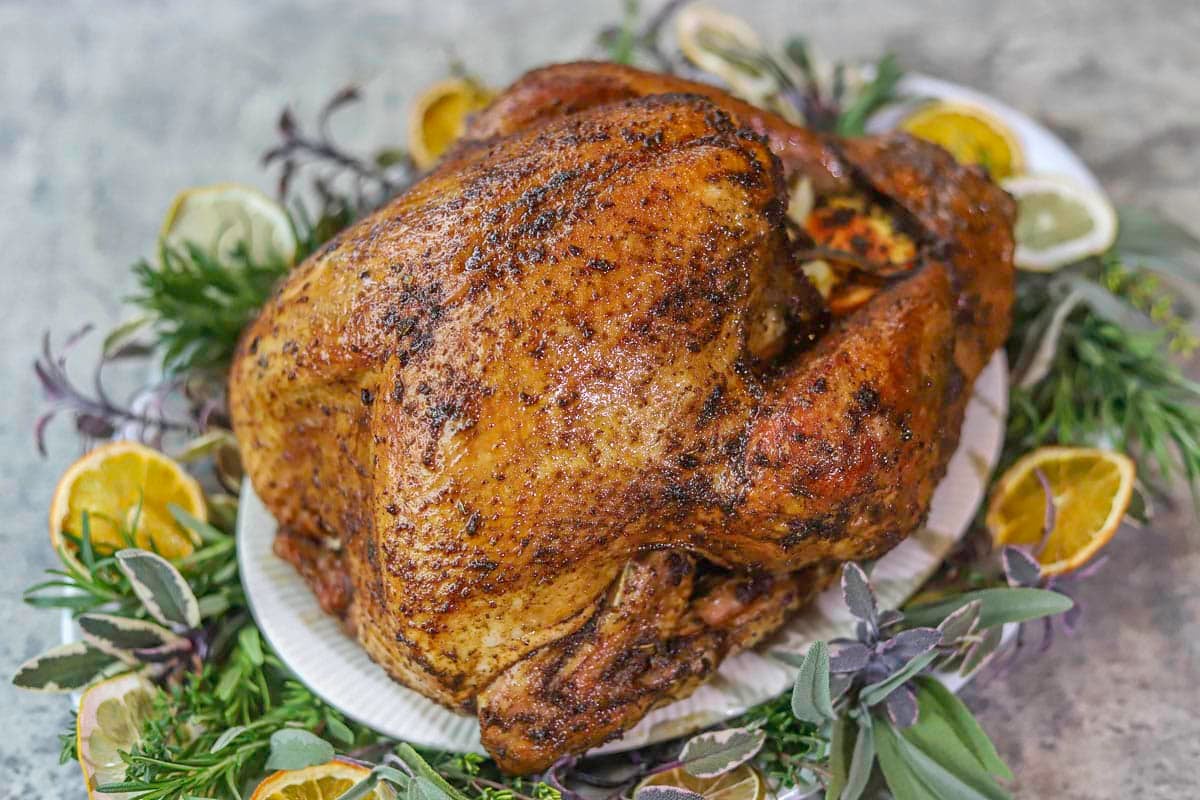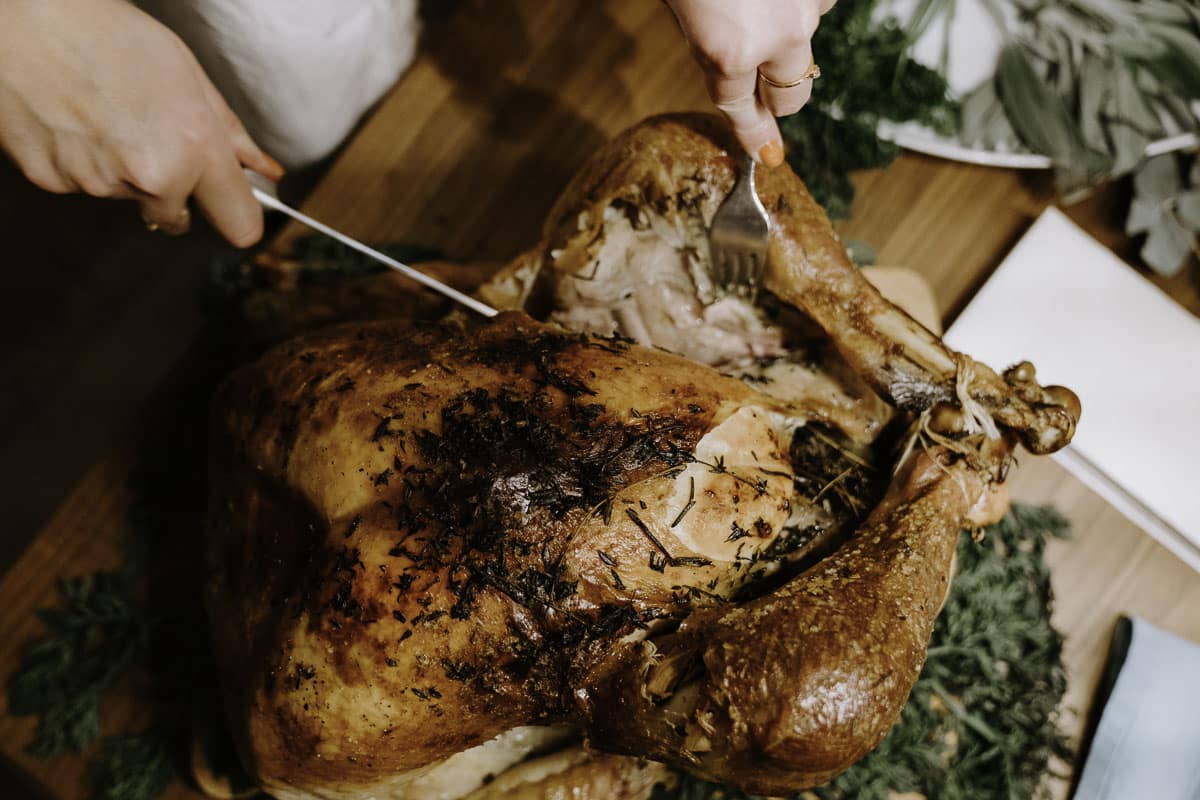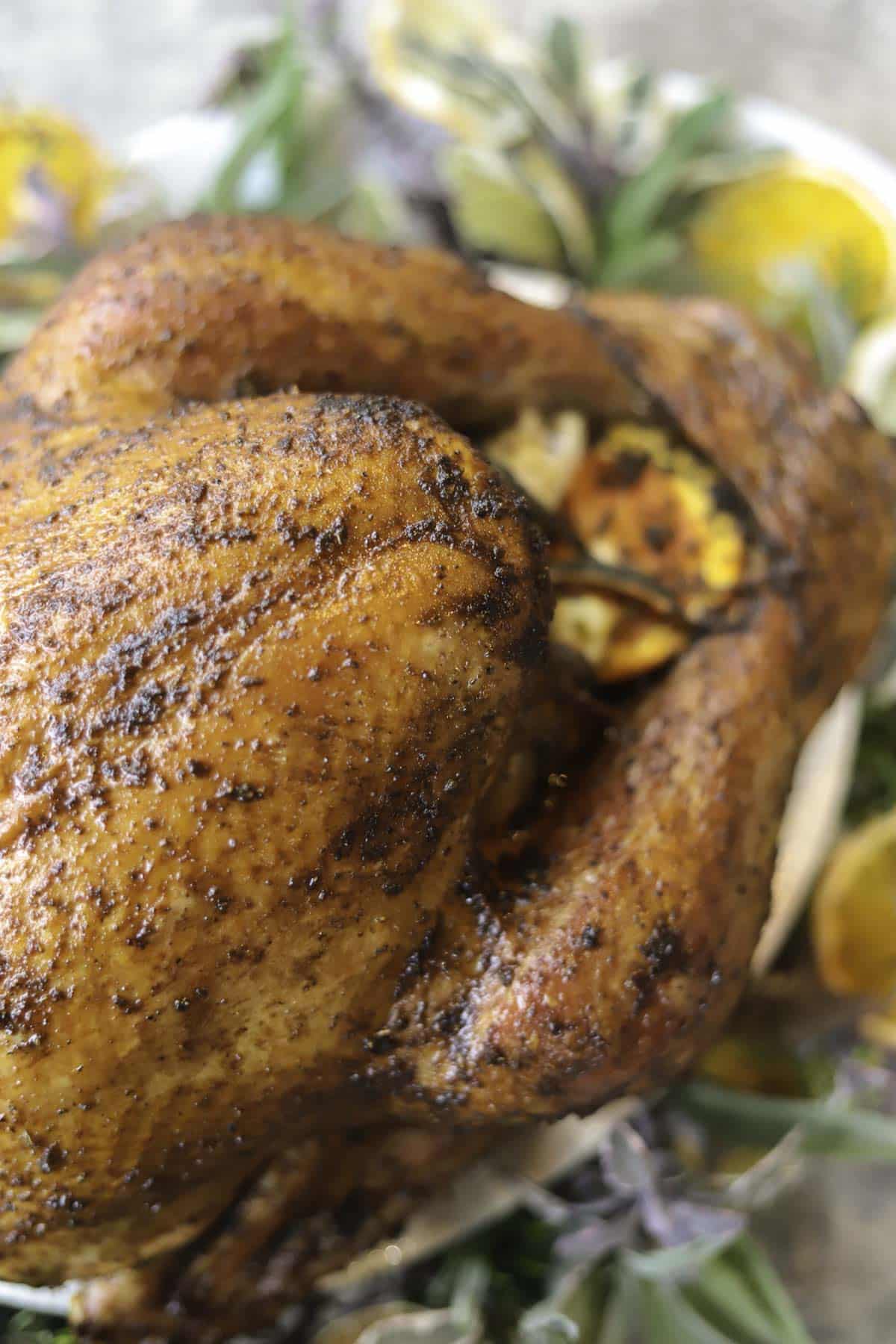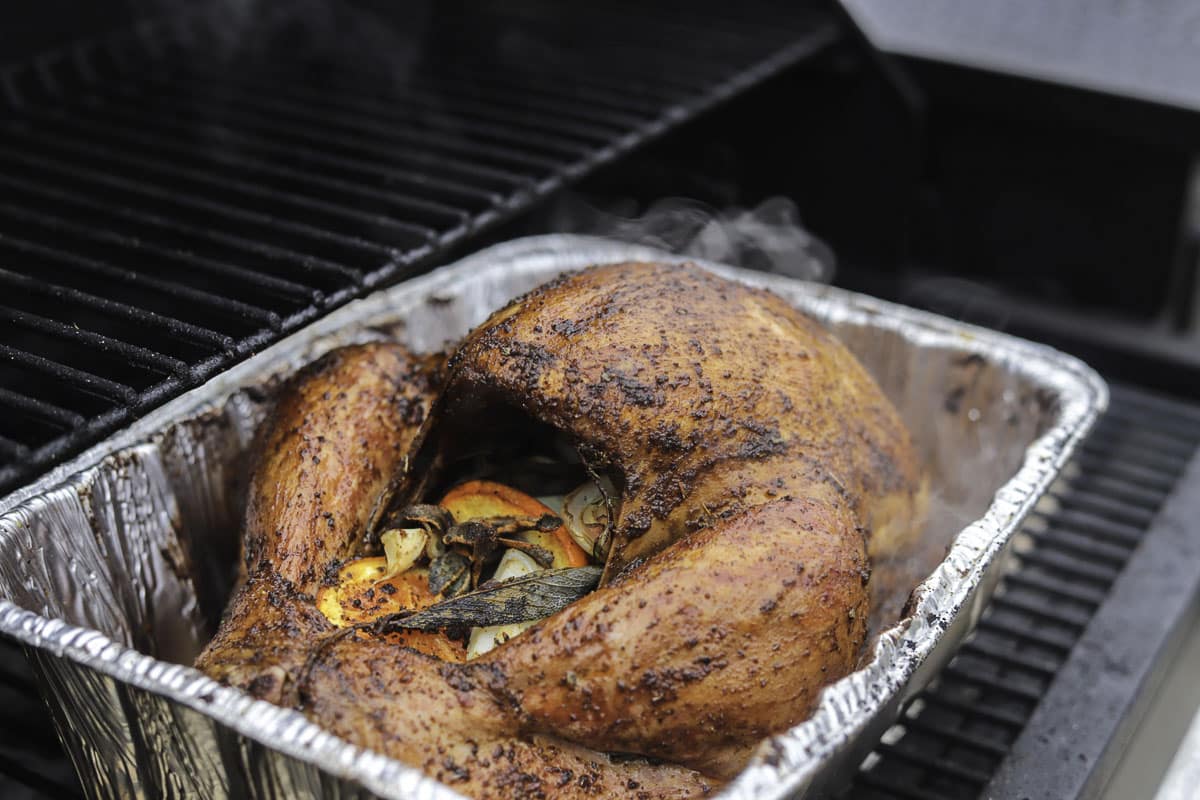Try this Traeger Smoked Turkey Recipe if you want to cook your Thanksgiving turkey in a new way this year. It’s tender, smokey, and easy to make! If you only have a small group, try my Traeger smoked turkey breast recipe instead!
It’s amazing how the turkey tastes when you smoke it on a pellet grill slowly at first and then finish it off at a higher temperature. The breast meat is juicy and the skin is crispy.
Do You Have to Brine a Turkey Before Smoking It?
As Thanksgiving approaches, many of us are starting to think about how we want to prepare the star of the meal – the turkey! For those who want to go beyond roasting and try smoking their bird, an important question arises: should you brine the turkey before putting it in the smoker? There is debate around whether brining is necessary or even beneficial when smoking meat. In this article, we’ll look at the pros and cons of brining before smoking to help you decide if it’s worth the extra time and effort.
What is Brining?
Brining involves soaking meat in a saltwater solution prior to cooking. The salt in the brine seasons the meat while also helping it retain moisture. Brining poultry like turkey can make the meat more flavorful, tender and juicy.
Typically you’ll want to submerge the turkey in the brine solution for 8-12 hours before smoking. Make sure the turkey is fully submerged and that the brine is cold throughout the process. A basic brine is made by dissolving 1/2 cup salt per gallon of water. You can add other flavorings like brown sugar spices, or citrus as well.
The Benefits of Brining Before Smoking
There are a few potential benefits to brining a turkey before putting it in the smoker:
-
Increased Moisture – Brining helps infuse moisture deep into the meat. This can help counteract the drying effect of the smoker.
-
More Evenly Seasoned – The salt and other flavorings distribute evenly throughout the meat during brining. This can lead to more balanced seasoning.
-
Tenderizes the Meat – The salt interacts with proteins in the meat to start breaking them down, making the turkey more tender.
-
Enhanced Flavor – Not only does brining season the meat, but it can also bring out more savory, turkey flavor.
-
Insurance Against Overcooking – Even if you accidentally oversmoke or overcook the turkey, brining provides a buffer of moisture and flavor.
These benefits make brining popular for roasting turkey, so it would seem like an obvious choice for smoked turkey as well. However, there are some potential downsides.
The Cons of Brining for Smoked Turkey
Here are a few of the reasons why some people choose to skip brining when smoking turkey:
-
Long Process – Brining takes hours and requires space in the fridge for a large container. Skipping it makes the process quicker and easier.
-
Dilutes Smoky Flavor – Since brining essentially seasons and cures the meat, some feel it masks the flavor of the smoke.
-
Makes Skin Soft – Brined meat tends to have soft, rubbery skin rather than crispy, crackling skin. This is less than ideal for smoked turkey.
-
Can Make Meat Too Salty or Wet – It’s easy to over-brine poultry, resulting in an overly salty flavor or soggy meat.
-
Unnecessary for Smoking – Smoking alone adds moisture and flavor. The low, slow heating gives the salt and smoke time to tenderize and season the meat.
So do the cons outweigh the pros when it comes to smoking turkey? Not necessarily.
Tips for Brining Before Smoking Turkey
If you do want the benefits of brining but want to avoid the potential pitfalls, here are some tips:
-
Use a Mild Brine – Cut back on salt and add brown sugar, citrus, or herb flavors instead. This prevents overt saltiness.
-
Brine for Shorter Time – Try cutting brining time in half, down to just 4-6 hours. This prevents the meat from becoming too saturated.
-
Pat Turkey Dry – Remove the turkey from the brine and pat dry with paper towels before smoking. This removes excess surface moisture for better skin.
-
Use a Dry Brine – Rubbing the turkey with salt, sugar, and spices can season without wet brining. Let sit overnight before smoking.
-
Inject Brine – Injecting a brine solution into the meat rather than soaking ensures even seasoning without as much excess moisture.
-
Smoke at Higher Heat – Move the heat up to 300-325°F to crisp the skin after brining. Monitor temperature carefully to avoid overcooking.
With these tweaks, you can find that balance between the benefits of brining and the ideal flavor and texture for smoked turkey.
Alternatives to Brining Before Smoking Turkey
If you try brining and it’s still not your thing, here are a couple alternative options:
-
Dry Rub – Coat the turkey generously with dry spices, herbs, salt, pepper, etc. Allow to sit overnight before smoking.
-
Marinade – Soak turkey in an acidic marinade made with citrus juice, vinegar, wine, etc. This flavors and tenderizes without as much moisture.
-
Injectable Marinade – Inject flavorful liquids like broth, melted butter, or marinade directly into the meat. This targets seasoning to the inside.
-
Stuff Aromatics – Stuff the turkey cavity with halved onions, garlic, herbs, citrus, etc. Let the aroma permeate the meat.
-
Sauce Glaze – Brush turkey with sauce glazes before and during smoking to add layers of flavor.

What To Do With Turkey Leftovers
Here are some great to use up your Thanksgiving turkey leftovers. After Thanksgiving, the first thing I do is make broth from the bones and carcass of the turkey. I then use this broth to make my famous Creamy Turkey Soup recipe. If you havent tried it, its a must! I look forward to it all year long.
I also like to use the turkey dinner leftovers to make these adorable Turkey Pot Pies. There are always turkey sandwiches, but these Gourmet Grilled Cheese Sandwiches are a step above.
Finally, you have to try this Healthy Turkey Tetrazzini recipe from Corinne at Wonder Mom Wanna Be. Its a lightened up version of a classic and well-loved dish!
How to Plate A Thanksgiving Turkey
Here is an easy way to plate a Thanksgiving turkey. Line the edges of a large platter with a mixture of fresh or dried herbs. I used two varieties of sage, thyme, and rosemary, the same herbs I used to stuff the turkey.

Next, I placed a smaller plate in the center. Make sure its large enough to accommodate the size of your turkey. Finally, add a pop of color. I added dehydrated oranges and dried lemon slices. If serving this Traeger smoked Turkey for Christmas, you can add pine fronds, dried bay leaves, and cranberries.

Not sure how to carve your turkey, heres a How to Carve A Turkey Guide with video and step-by-step instructions.

I’ve got you covered if you’re looking for side dish ideas to go with this Traeger turkey recipe! This stunning Thanksgiving fruit salad is sure to impress! If you’re feeling a little indulgent, this Chipotle Smoked Mac and Cheese is rich, smokey, and so comforting!
These Easy Scalloped Potatoes start in an Instant Pot and finish in the oven are another great choice. Finally, for more traditional Thanksgiving side dishes, you could try this tasty whole-berry cranberry sauce or this simple but tasty sausage stuffing.
The size of the turkey will depend on the number of guests. You should plan for 1 to 1-½ lbs of turkey per guest. Remember that some of that weight accounts for the bones, neck, and giblets (gizzards, liver, and heart). If you have more than 10 guests, consider smoking another turkey or a turkey breast.
You can smoke a turkey on a pellet grill with apple, maple, cherry, pecan, oak, or hickory wood.
Although there are many brined turkey recipes out there, I prefer to skip this step. Instead, I inject the turkey with butter, which makes it really tender. The turkey will stay tender and juicy even longer if you smoke it at a lower temperature and baste it.
In order for the smoke to penetrate the turkey, it should not be covered with aluminum foil. However, the turkey can be loosely tented with foil as it rests.
Ensure the skin is coated with ample oil, butter, or pan juices then smoke the turkey until the internal breast temperature reaches 150°F. Turn the grills temperature up to 400°F and continue to smoke the turkey until the breast temperature registers at 165°F.
Plan on smoking your turkey for approximately 30 to 40 minutes per pound.
It will take approximately 7-8 hours to smoke a 15-pound turkey. Keep in mind this number can fluctuate based on the outside temperature and how many times the lid is lifted.
Meat Church : How to Brine and Smoke a Turkey
FAQ
Should you brine a turkey before you smoke it?
What happens if you don’t brine a turkey?
Can you smoke meat without brine?
How do you prepare a turkey for smoking?
Can you use a brine to smoke a Turkey?
Love this Smoked Turkey Brine! It is so easy to use and we have included it in the recipe card for you as an option when smoking your bird. A wet brine infuses flavor and moisture into your turkey so it is ever more juicy! Alternatively, you can use a dry brine which involves brining a turkey in a salt mixture – both work very well!
How long do you brine a Turkey?
Once the brine is completely cool, add your turkey to it and keep it in the fridge for at least 12 hours and up to 24 hours. The general rule of thumb for brining is at least 1 hour per pound of turkey. Let your turkey air dry for the crispiest skin.
Can you add ice to brine a Turkey?
If it’s still hot you can add ice to cool down faster. Add turkey to brine and refrigerate for 24 hours. Remove turkey from brine and pat dry. There is no need to rinse the turkey. Nutrition information is automatically calculated and should be used as an approximation only. If you’re worried you could always add a side of kale.
Should you brine a Turkey before cooking?
Soaking your turkey in a salty bath makes it moist, tender, and full of flavor. The secret to perfect poultry lies not just in how it’s cooked, but in what’s done to it before cooking. This year, carve out some time to brine your bird. A brine is a salt and water solution that can also contain sugar and other flavorings.
Can You brine a Turkey in saltwater?
The added moisture from the water should stop the turkey from drying out, especially when slow cooking it in a smoker. To brine turkey in saltwater, you first need a large pot that will allow the liquid to cover the turkey. Typically, you would let the turkey sit for around 12 hours prior to smoking.
Do you use brown sugar when smoking a Turkey?
Brown sugar adds a certain sweetness and may enhance the color when smoking. We don’t use it but that’s our personal preference. We usually put our turkey in the brine early in the morning the day before we plan on smoking it. We give it eight hours, so it comes out of the brine in the afternoon or early evening.
